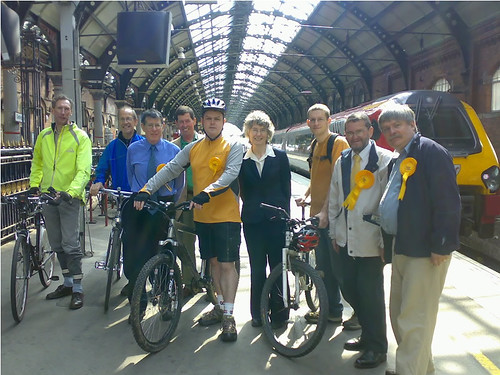
News that the Northern Rail Cycling Forum is coming to Darlington next week is a timely reminder of that company's attempts to encourage integration between two forms of sustainable travel. The forum brings together a range of cycling organisations with representatives of Northern Rail at regular meetings held around the North.
Despite their leaky and ancient rolling stock, Northern have an excellent and helpful policy towards cyclists. I, and many friends, have found their staff to be extremely accommodating and helpful. You get the feeling that, if they had the money - or state encouragement - Northern might start investing in the kinds of carriages that are used by cycling-friendly operators around Europe. As part of that cooperative approach, the Campaign has been invited along next Wednesday to the Dolphin Centre.
Sadly, our colleagues from Newcastle Cycling Campaign have had less luck. There, Nexus-run Tyne and Wear Metro use "health and safety" considerations to ban cyclists from bringing their bicycles on to their trains. Metro train drivers are known to call the police out to evict a cyclist from an otherwise empty carriage. Newcastle is currently going through the consultation stages of a cycling strategy for the city, as well as its Local Transport Plan 3. Neither mentions the metro bike ban. Newcastle Cycling Campaign have raised this strongly in their response to LTP3.
Sadly, our colleagues from Newcastle Cycling Campaign have had less luck. There, Nexus-run Tyne and Wear Metro use "health and safety" considerations to ban cyclists from bringing their bicycles on to their trains. Metro train drivers are known to call the police out to evict a cyclist from an otherwise empty carriage. Newcastle is currently going through the consultation stages of a cycling strategy for the city, as well as its Local Transport Plan 3. Neither mentions the metro bike ban. Newcastle Cycling Campaign have raised this strongly in their response to LTP3.
Which leads us neatly to what we thought we had in store in the near future, the Tees Valley Metro. Funding was in place and work was ready to commence - until the Con-Dem government came along. Like much else in the area, the whole project is now up in the air, thanks to the government's spending review.
So for now we are stuck with Northern's rickety old trains. But at least they have pleasant staff who are welcoming to cyclists. A reminder, perhaps of the days when British Rail once catered for somewhat more of us:







